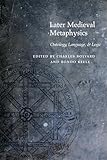Later Medieval Metaphysics : Ontology, Language, and Logic / ed. by Rondo Keele, Charles Bolyard.
Material type: TextSeries: Medieval Philosophy: Texts and StudiesPublisher: New York, NY : Fordham University Press, [2022]Copyright date: ©2013Description: 1 online resource (238 p.)Content type:
TextSeries: Medieval Philosophy: Texts and StudiesPublisher: New York, NY : Fordham University Press, [2022]Copyright date: ©2013Description: 1 online resource (238 p.)Content type: - 9780823244737
- 9780823292011
- online - DeGruyter
| Item type | Current library | Call number | URL | Status | Notes | Barcode | |
|---|---|---|---|---|---|---|---|
 eBook
eBook
|
Biblioteca "Angelicum" Pont. Univ. S.Tommaso d'Aquino Nuvola online | online - DeGruyter (Browse shelf(Opens below)) | Online access | Not for loan (Accesso limitato) | Accesso per gli utenti autorizzati / Access for authorized users | (dgr)9780823292011 |
Frontmatter -- Contents -- Acknowledgments -- Introduction -- Part I essence, existence, and the nature of metaphysics -- 1 Duns Scotus on Metaphysics as the Science of First Entity -- 2 Aquinas vs. Buridan on Essence and Existence -- Part II form and matter -- 3 The Form of Corporeity and Potential and Aptitudinal Being in Dietrich von Freiberg’s Defense of the Doctrine of the Unity of Substantial Form -- 4 Accidents in Scotus’s Metaphysics Commentary -- Part III universals -- 5 Avicenna Latinus on the Ontology of Types and Tokens -- 6 Universal Thinking as Pro cess: The Metaphysics of Change and Identity in John Buridan’s Intellectio Theory -- Part IV language, logic, and metaphysics -- 7 Can God Know More? A Case Study in Later Medieval Discussions of Propositions -- 8 The Power of Medieval Logic -- 9 Iteration and Infinite Regress in Walter Chatton’s Metaphysics -- 10 Analogy and Meta phor from Thomas Aquinas to Duns Scotus and Walter Burley -- Notes -- List of Contributors -- Index
restricted access online access with authorization star
http://purl.org/coar/access_right/c_16ec
The multi-author Essays in Later Mediaeval Metaphysics focuses primarily on 13th and 14th century Latin treatments of some of the most important metaphysical issues as conceived by many of the most important thinkers of the day. Thomas Aquinas, John Duns Scotus, William of Ockham, Walter Chatton, John Buridan, Dietrich of Freiburg, Robert Holcot, Walter Burley, and the 11th century Islamic philosopher Ibn-Sina (Avicenna) are among the figures examined here. The work begins with standard ontological topics—e.g., the nature of existence, and of metaphysics generally; the status of universals, form, and accidents. Here, a number of questions are considered. What is the proper subject matter of metaphysical speculation? Are essence and existence really distinct in bodies? Furthermore, does the body lose its unifying form at death? Can an accident of a substance exist in separation from that substance? Are universals real, and if so, are they anything more than general concepts? There is also an emphasis on metaphysics broadly conceived. Thus, discussions of theories of mediaeval logic, epistemology, and language are added to provide a fuller account of the range of ideas included in the later mediaeval worldview. Many questions are raised in this context as well. What are the objects of propositional attitudes? How does Aristotelian logic stand up against modern predicate calculus? Are infinite regress arguments defensible in metaphysical contexts? How are the notions of analogy and equivocation related to the concept of being? Contributors include scholars of mediaeval philosophy from across North America: Rega Wood (Indiana), Gyula Klima (Fordham), Brian Francis Conolly (Bard College at Simon’s Rock ), Charles Bolyard (James Madison), Martin Tweedale (emeritus, Alberta), Jack Zupko (Winnipeg), Susan Brower-Toland (St. Louis), Rondo Keele (Louisiana Scholars’ College), Terence Parsons (UC-Irvine), and E. J. Ashworth (emeritus, Waterloo).
Mode of access: Internet via World Wide Web.
In English.
Description based on online resource; title from PDF title page (publisher's Web site, viewed 03. Jan 2023)


